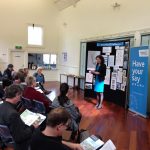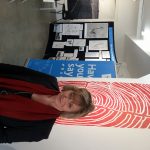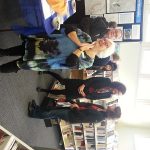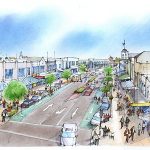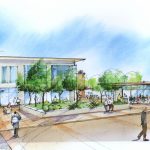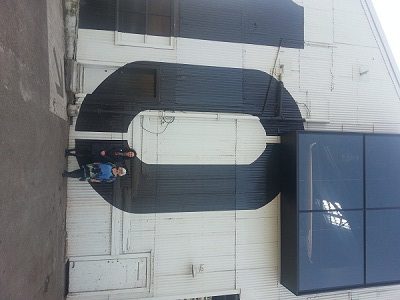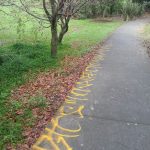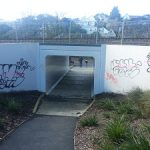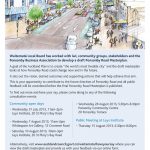 This report covers my activities from 1 July – 31 July 2013.
This report covers my activities from 1 July – 31 July 2013.
Portfolios: Community, Transport- West
Positions: Grey Lynn Business Association, Newmarket Business Association (alternate)
Committees: Grants (Chair), Central Joint Funding
PORTFOLIO REPORTS
Community Development
Community Facilities
The community portfolio met the new Community Facilities team for the first time during July. For some time now we have been concerned about the standards at our halls for hire. It was good to hear that a new cleaning contractor has been in place from 1 July and that hirers are being offered the option of paying a service fee of $120 for cleaning.
We also heard from the Manager of Community Occupancy that recent hirer surveys have returned a satisfied or very satisfied of 89%.
We also raised our concern that Campbell Free Kindergarten building lease has still not been finalised due to the delay installing a new kitchen.
Graffiti
During the month I reported two lots of graffiti and was impressed with the speedy response. Within 24 hours Civic contractors called to confirm that the graffiti has been removed. Civic Contractors have recently won the contract for vandalism prevention for the Central area.
Sustainability initiatives
Environmental services are looking at how to work more effectively with community development on sustainability initiatives that have wider community benefits. During the month we had a workshop with the new Sustainability Programmes Manager and heard about a number of potential projects including “Sustainable Streets” that has been piloted by Albert – Eden Local Board and opportunities for Neighbours Day.
 Anti- social behaviour in St Patrick’s Square
Anti- social behaviour in St Patrick’s Square
Residents of St Patrick’s Square have raised with Auckland Council their concern about the anti-social behaviour of skateboarders who find the Square a desirable place to skate.
These are clearly major issues that needs to be resolved. However the proposed solution of NO SKATING signs is not going to work and is unnecessary. It also adds visual pollution and reinforces negative behaviour.
We have asked the senior safety adviser to consider the international evidence that NO SIGNS are not effective and to look at other options. Such as making the square less attractive to skate and providing directions and a safe route to the skate park.
Regardless of whether a sign is in place, if anti-social behaviour does occur the Council can still act in accordance with the Nuisance by-law which prohibits the use of skateboards in a manner which may damage a public place or intimate or be dangerous or injurious or cause a nuisance to persons in the public places.
Transport
Auckland Transport’s quarterly report is on our agenda this month including an update on our Local Board agreement projects. Auckland Transport also reports on the main issues raised at our monthly catch up.
Central East- West Transport Study
Auckland’s City Centre has been diminished by the motorway “collar” and the volume of traffic travelling through the city. It is therefore great to see the work that is progressing from the vision set out in the City Centre Master plan.
We received an all of Board presentation on the study that has looked at the proposals for the key east –west routes. The proposals for Wellesley Street, Victoria Street, Quay Street and Fanshawe Street are particularly impressive and have the potential to make Auckland a walkable city where people embrace PT as the preferred option to get into the city Centre.
Parking
Auckland Transport announced in July that the St Mary’s Bay parking scheme trial would be extended for another year and the zone expanded to include Hackett Street.
A parking survey is going to Freemans Bay residents about parking concerns in their area.
Promotion of bike parking at events
Auckland Transport has a new initiative to take temporary bike parking to events and farmers markets over the summer. Last summer Auckland Transport discouraged ATEED from promoting active transport for “safety reasons” so it is great to hear about this new approach.
OTHER BOARD ACTIVITIES
Unitary Plan
July has been the month to read the extensive feedback on the Unitary Plan and to finalise the Board’s feedback (to be tabled at an extraordinary meeting on 8 August).
I have attended all of the Board’s workshops on the Unitary Plan as well as the all-day mapping workshops on 12 July and 2 August.
Release of the draft Ponsonby Road master plan
After many months of work by the Ponsonby Road master plan working group the draft Ponsonby Road Master plan was released on 26 July 2013.
The presentation speech is attached as ATTACHMENT A.
Feedback on the plan is open until 4 September.
Photos from the release event and the first pop in session held
Resource recovery centre
In July we received an update on the business case that is currently being prepared for the establishment of a facility that will provide a model for a future resource recovery network across the Auckland region. Progress has been made on identifying a suitable site that can serve the Waitemata, Puketapapa and Albert-Eden Local Board areas.
This is one of our key projects for 13/14 and is an exciting opportunity to create local jobs, minimise waste, teach new skills and make a significant contribution to the vision of Auckland becoming zero waste city. It is also complementary to the Council’s Waste Management and Minimisation Plan adopted in June 2012.
Auckland Conversations
Over the last three years we have been treated to some amazing speakers as part of the excellent Auckland Conversations series. I have learnt a huge amount from the experts about design, planning, heritage, environment and socio-economics. All topics of huge relevance to the discussion about Auckland’s future development.
Of all the speakers, Harvard Professor Edward Glaeser who visited in July, was an absolute standout. The author of the Triumph of Cities: How our Greatest Invention Makes Us Richer, Smarter, Greener, Healthier and Happier he spoke from an international perspective about urban policy, housing affordability, road pricing, the environmental challenge and what makes a modern day competitive city.
Key points that I noted:
-
Future of NZ depends on Auckland thriving – Auckland has to work at attracting and retaining people which requires quality of life strategies
-
Cities provide pathways out of poverty. But should not ignore inequalities- the best investment is early childhood education
-
Government’s focus should be on providing educational and removing barriers to entry
-
It is for local government to manage the “demons that come with density” – such as contagious diseases, and clean water; crime and corruption; traffic congestion
-
Cities are the more sustainable way of living – allows for people to better protect the environment
-
Essential to get land use policy right to make the “magic” of cities happen
-
If you make it easier to build then there is less price volatility
I was particularly interested in his comments about transport infrastructure investment and road pricing. Professor Glaeser’s view is that you cannot engineer your way out of congestion. You have to charge for valuable assets such as roads and it is in fact a “Soviet approach” to give away a valuable resource for free. He pointed out Singapore as the place to have got electronic road pricing right. Road pricing is economically sound and not regressive as some argue but actually a progressive approach if the proceeds are invested in PT.
With regards to the debate about how we can intensify while protecting heritage. His view is that every time a city says no to build up saying no to a family who wants to take advantage of living in a city. He advocates not turning cities into museums as this makes them unaffordable. Also if you freeze growth then Auckland will turn into a boutique town that won’t do its job of providing opportunities for a wide range of people.
He also cautioned against community led neighbourhood planning when it is used as a tool of NIMBYs to say no to development
(An interview by Geoff Cooper, Chief Economist and Professor Glaeser is available on shapeauckland.co.nz and the video of the event is on the Council website. )
In other Auckland Conversations Joris de Bres, former Race Relations Conciliator gave a challenge to Auckland Council to lead the way by understanding the % of employees of different ethnicities at all levels of Council and working out in the community and for Council engagement to be done in the community’s own languages. He has a vision of Auckland as a multi-lingual city and supports the IMSB te reo vision.
LGNZ conference
I attended the LGNZ confererence – Transforming Communities building a successful New Zealand in Hamilton from 21- 23 July. My conference report is attached as ATTACHMENT B.
Local Board Workshops and meetings
I attended during July
-
Key Stakeholder workshop on 1 July – way finding systems and design presented by the creators of Legible London
-
Waitemata Local Board weekly workshop on 2 July
-
Review of Local Board community centre funding for 2013/2014 meeting on 3 July
-
Relationship manager meeting on 3 July with Waitemata Local Board committee chairs to review best practice for next term
-
Resource Recovery Facility – business case update at Puketapapa Local Board office on 3 July
-
Meeting with Libraries to discuss proposed property and renewals programme on 3 July
-
Communications catch up on 3 July
-
Deborah White, presentation on Auckland Art Week
-
Neighbourhood Planning Task Group meeting convened by Roger Blakeley on 4 July
-
Quay Street quick wins workshop on 9 July
-
Waitemata Local Board business meeting in Grey Lynn on 9 July
-
Meeting with Jane Bennett from Housing New Zealand Corporation to discuss a possible redevelopment they are considering in Parnell
-
Ponsonby Road master plan fortnightly catch up with officers
-
Fairtrade Auckland meeting to provide an update on Council’s implementation of Fairtrade
-
Waitemata Local Board weekly workshop on 11 July
-
All of council all day Unitary Plan mapping workshop on 12 July at the Rendezvous Hotel
-
Media briefing – Funding Auckland’s Transport Future report of the Consensus Building Group
-
Local Boards Chairs Forum on 15 July
-
Arch Hill Residents meeting to discuss next steps to stop the Bunning’s development on Great North Road on 15 July
-
Waitemata Local Board weekly workshop on 16 July
-
Meeting to finalise the draft Ponsonby Road master plan and confirm engagement plan
-
Community Development and Partnerships monthly catch up with the portfolio holders on 17 July
-
Meeting to discuss business case for Pioneer Women’s and Ellen Melville Hall redevelopment
-
Meeting with Kaaren Goodall to discuss the workshop on apartment dwellers
-
Meeting to discuss the cleaning, maintenance and daily operations of Waitemata community halls
-
Transport portfolio monthly catch up with Auckland Transport
-
Extraordinary Waitemata Local Board meeting on 25 July regarding the board’s Unitary Plan feedback
-
Placemaking Workshop with Kaaren Goodall & Frith Walker, Waterfront Auckland
-
Waitemata Local Board Unitary Plan discussions with Auckland Plan Committee led by Shale Chambers on 29 July
-
Waitemata Local Board weekly workshop on 30 July
-
Meeting to discuss the Waitemata Local Board Unitary Plan Feedback on 31 July
-
Meeting to discuss options for dealing with the anti- social behaviour in St Patrick’s Square
Events and functions
During July I attended:
-
Auckland Conversation presentation with leading Harvard economist 2013 Sir Douglas Myers Visiting Professor, Edward Glaeser on 1 July
-
Auckland Conversation: WALK London, New York and Auckland on 2 July
-

The Annual Travelwise Awards at the Cloud on 3 July
-
Seddon Fields Artificial Turf Opening on 5 July
-
Auckland Conversations: Cultural diversity and race relations: Reflections after a decade as New Zealand’s Race Relations Commissioner
-
Bad Jelly the Witch production on 12 July at the invitation of Auckland Theatre Company
-
-
Grey Lynn Business Association networking breakfast
-
LGNZ conference in Hamilton 21-23 July (conference report back attached)
-
St Marys Bay Association AGM – I gave an update on the draft Ponsonby Road master plan
-
Release of the draft Ponsonby Road master plan event at the Ponsonby Community Centre on 26 July
-
Stop the GCSB Bill protest on Saturday 27 July
-
Re-opening of Shed 10 on 31 July
-
Public ‘Drop-in’ Engagement Session – draft Ponsonby Road Master plan at the Leys Institute Library on 31 July
 This update was published in the February Ponsonby News
This update was published in the February Ponsonby News


